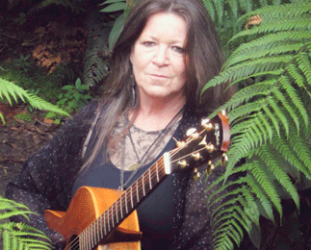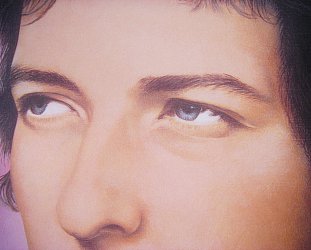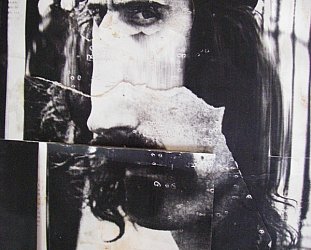Graham Reid | | 9 min read

UK singer-songwriter Beth Rowley is one of those 10-year in the making overnight sensations. Her debut album Little Dreamer has won her wide acclaim -- “the next big thing", said the Independent, “destined for number one” weighed in the Sunday Times -- but because she has worked her way up from small pubs she seems very grounded, smart and focused. This phone interview took place in early August 2008.
Hiya Beth. I’m from New Zealand, the land of Crowded House whom you have done something with?
Yeah, we did. I was recording my album in North London and they happened to be in there doing their album [Time on Earth] and we got talking and they were really nice guys and they wanted me to do some little vocals on one of their songs. I was a little bit apprehensive about what sort of thing they were after, but I did it and it went onto the album. Transit Lounge is the song and they attributed me on the cover as contributing ‘ethereal singing’. And then we did some festivals and things.
You mention festivals, I’m wondering what level you are hitting in at now. I know you are headlining but at what sort of venues?
I guess it’s still at the beginning [of the album] but it is kind of what I am used to, around the 250 capacity mark and in the UK there are a whole lot of intimate venues like that -- which is where I come from, the pub singer-songwriter scene where there is lots of faces looking at you and you can see people looking at you. That is what I am used to so I am enjoying it at the moment.
One of the things I have read is that usual sort of phrase -- although I don’t think they said ‘overnight sensation’ -- but that you seemed to have come out of nowhere. But that’s not actually true, you went from open mike nights to opening act to album and now headliner -- and that has taken 10 year as a steady trajectory.
Yes, people suddenly hear of you -- especially now when there are a lot of singers out there -- and they think you have become a singer overnight. It is really funny talking to people who haven’t done any sort of research at all when they say that. Yes, it has been a journey and I started really when I was about 16. And I’ve enjoyed every bit of it on the way.
You’ve actually done it in what we might call the old style from open mike nights and working your way up live, very much the old style schooling and experience you would get if you were doing jazz or folk. In the internet age it seems many people think if they get their song on MySpace they will be famous overnight.
Definitely. Recording was really . . . well I’ve only just started that in the last couple of years, I did a couple of EPs which I did with a guy, Ben Castle.
He’s [actor/singer/trumpeter] Roy’s son isn’t he?
Yeah, he is and we met about five years ago and helped me produced the EPs and I love recordings. But the old style thing you are talking about is that love of the live performance and I never wanted to do anything else apart from get out there and sing. Getting out there and doing it is the only way to learn, the learning curve and you have to do it to know.
Also though you start doing covers -- and you still do them obviously -- but that teaches you how other people write and then you start to write your own material. That to is a very unusual thing today because everybody in rock band particularly wants to write their own songs straight away but many of them don’t know how to because they’ve never studied the craft. I’m guessing you grew up in a house where there was a lot of diverse music.
Absolutely. The first open-mike night I went to I took along my Carole King Tapestry album and tried to play those songs on guitar. I don’t play guitar well so I am still nervous when I play, but that is something I’ll continue with. But yes, I took along that album and found a guy to play with me, and Tapestry is pretty much it as far as song craftsmanship. A good starting point at least.
Was it your dad who had a lot of different music in the house: gospel and blues and so on?
Yeah, that’s true.. He was a key figure.
Was he a musician?
Yes although he wouldn’t call himself that because he hasn’t done it professionally. But he is a big Hank Williams fan and there’s a quote I remember him saying, ’any more than three chords is just showing off’. He can play so many songs on just three chords! My brother John is older than me and he’s a real music enthusiast and I tend to run things past him for his opinion and that is important to me.
You also studied music at the Brighton Institute of Modern Music. What is that place, is it like a university?
Yeah it is, I think it’s linked to the college in Brighton and is affiliated with a proper college but it was a privately run place when I did a year’s course. I did a higher diploma when I wasn’t really sure what I wanted to next and although I knew it was music I wasn’t sure which direction and thought it would help to go and study. And I really like Brighton, I like being by the sea so that was a big thing. It is so lovely and I used to walk every morning along the beach to college and that was one of the main reasons I went, then also [jazz and soul singer] Carleen Anderson was there.
She had a teaching residency?
Yeah, she was a vocal coach who would come in and help with technique. She was someone when you look at her career you think, ‘oh!’ and her talent is just . . . She is a really special lady and I’m sure she doesn’t know how amazing she is, she deserves to be a lot more . . .
Did she give you specific instruction on pitch and so on?
Yeah, she definitely would. And she would quite often demonstrate. The classes were really small, maybe 12 people, and you would sit in a circle and she would be in front of us like in a singing lesson. Maybe two hours a week she’d be with us, and she would give us techniques for breathing. We could have one-on-one with her and she was very accessible and you’d quite often forget who she was, then she’d sing! Suddenly you’d remember just who you were with in the room.
We’re still good friends and Ben that I mentioned earlier has been working with her for quite a while and they will be doing something together again in a couple of months again.
Aside from your dad as a formative person and Carleen who was there at the right time, who else has been instrumental in, not so much your professional career, but in the music?
In Bristol where I started off there is an amazing community who swap around like a family and if someone can’t play then someone else nearby who you know and you’ve played with lots before can step in. There’s a guy I met about eight or nine year ago, his name is John Fenlon and for years he had a blues band, the John Fenlon Blues Band, and it was just a Bristol band and they’d go around the county. But he is the most incredible blues harp player and has been giving me lessons for a few months now. And wherever I can, I get him to come and play at my gigs.
He’s an older guy, a carpet layer by day, but he has this other life which everyone knows him for. He is inspiring and must be about 50, I don’t even know. He’s got two children whom I know but I’m sure his daughters must have wondered why this young girl was round at their dad’s house the whole time. He’s such a great guy and there are small singer-songwriter nights in Bristol that me and him go to quite a lot with another friend, also another older chap.
So is John the guy on the YouTube clip playing harp where you do that old George Formby number Leaning on a Lamppost?
Yeah, that’s him. He’s got a curly mullet!
That’s a remarkable transformation you do with that song, I only ever knew it as a novelty song by Formby -- and Herman’s Hermits covered it.
Right, do you like it?
Yes I do, it is just a completely different version.
A lot of people really don’t like it, his hardcore fans, and a few sent e-mails a while ago. But I thought half my fans don’t know who he is but now they do so that’s a good thing.
Let’s talk about some of the tracks on the album. First of all Nobody’s Fault But Mine, that’s a beautiful version of a song that is possible to do very badly. Not an easy song, quite daring to open an album with that.
I guess I started singing it really early on and I heard Nina Simone do a version and that was the first I heard of it. That was obviously an influence, and there was something captured in her voice, but the lyrics as well, I just really liked. I never heard a song which has captured something like that also, the simplicity of it. It made me feel this was accessible to everybody, they could all get something from it on many different levels -- and I thought I would just give it a go. I couldn’t help myself but try and as the years went on I kept doing it at singer-songwriter nights and it evolved quite a lot. I didn’t want to do it too similar to Nina Simone and thought if you do a cover you have to bring something quite different to it. This was more like her version, although Led Zeppelin and a few other people have done covers of it.
And your originals, there is something more of a 60s pop feel to some of yours like Dusty Springfield and Sandie Shaw. Is that an area of listening you have done?
Yeah, I really loved PP Arnold, people who were capturing something in that era.
In all the years I have spoken to hundred if not thousands of musicians you are the only person who has ever mentioned the great PP Arnold. So hats off to you.
Really? That’s fantastic. She was amazing and I am very inspired by her. I went through a phase of writing songs that sounded like her and had to stop myself, but I’ve always had that problem, I hear something I love and . . .
I went to see Willie Nelson one night and the next day we had a rehearsal and . . . . because he has this style where he sings lazy and behind the beat and he’ll just casually come in halfway through the line and cram the words in right before the end. I just thought it was really freeing. And the whole next day without realising it that is what I did and the guys in the band were saying ‘why are you singing like that?’
I just loved it, and you are inspired by people all the time. And there is that song of his I do on the album Angel Flying Too Close to the Ground. When I do that I might subconsciously bring a little bit of [his style] to it.
It is a very jazzy style. Sinatra used to do that too, coming in a fraction behind the beat does give it a lazy and gentle feel.
I think you get to that without realising, if it gets to the point you are becoming someone else though you need to get back. But it’s all about technique too and you are constantly learning.
You would hope so. What happens now Beth? I guess the United States beckons.
Yeah, I’m going to try and obviously make the most of the interest here and we’ve got a tour coming up in October -- but I guess whatever is offered, I’ll go wherever people are loving it. Fingers crossed.
Given that the kind of music make -- jazz, blues, gospel and country -- is all out of the States, have you been?
Yeah, I have a few times, we are going next week to do a showcase in New York.
What club is that in?
Joe’s Pub.
I think that’s the one Norah Jones and her band were playing at for a long time, she had a casual residency there and even when her first album broke she still did it. That would be a very good showcase. All the very best with it.
Thank you.







post a comment